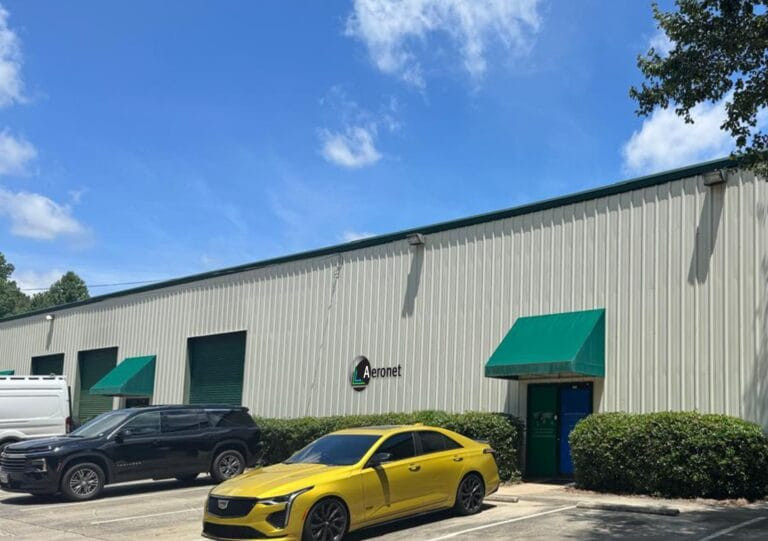The shift toward regionalised logistics has taken on new urgency in the Air Cargo sector, where delays, volatility and growing customer demand are putting pressure on service providers to act faster and closer to market. For AeroNet, a Europe-based manufacturer of certified air cargo restraint systems, the decision to open its first US facility in Newnan, Georgia, is less about geographic expansion and more about reengineering operational distance into delivery performance and reaching towards potential customers.
“We chose Georgia, specifically Newnan, because of its strategic proximity to Hartsfield-Jackson Atlanta International Airport,” said Ludovic Coatmellec, Chief Executive Officer of AeroNet. “This location provides direct access to a high-volume logistics network across the US, allowing us to stay closer to both current and potential customers. As a result, we can offer faster service, build stronger partnerships and enhance our overall operational efficiency.”
The proximity to Atlanta, the world’s busiest airport by passenger volume and a key airfreight hub, positions AeroNet’s US operation within a mature distribution ecosystem. The decision also reflects a growing pattern among European and Asian manufacturers: to create regional footprints capable of solving not just supplying logistical needs in market.
With lead time pressures mounting, particularly for specialised cargo components and safety-critical items, physical proximity is increasingly linked to competitive viability. In this case, the ability to hold stock domestically, provide on-the-ground support and respond in real-time gives AeroNet a more credible claim to reliability in a region where operational slack is narrowing.
The decision to expand now was driven by the increasing demand for faster, more reliable service from its US-based clients.
Those challenges reflect a broader industry problem: fulfilment models built around centralised production have struggled to keep pace with regionally dispersed demand. When customers are ordering nets, pallets, or cargo restraint kits in response to flight availability or aircraft maintenance schedules, delays become more than inconvenient; they risk operational disruption.
AeroNet is aiming to remove that friction. “By establishing a US-based facility, AeroNet eliminates delays tied to international shipping, ensuring faster product availability and significantly shorter delivery cycles,” Ludovic COATMELLEC said. “Our local presence enables us to provide real-time support, quicker turnaround times and customised solutions tailored to the specific needs of our North American customers.”
According to IATA, North American carriers saw a 4.2 percent year-on-year air cargo demand growth in April 2025, with capacity also rising by 4.6 percent. As shippers adjust their own timelines to accommodate a faster moving airfreight landscape, downstream suppliers, particularly those offering certified restraint solutions, are being pushed to match that cadence.
Beyond serving existing customers more efficiently, the US base also opens access to prospective accounts that previously may have ruled out working with overseas providers due to time constraints. “This local presence opens new opportunities to serve prospective clients across North America who are seeking certified and high quality Cargo Restraint Solutions,” said Ludovic COATMELLEC.
Opening a facility is one thing. Running it to meet market expectations is another. In the US, where domestic competition is built around speed, service, and real-time availability, merely having stock nearby is not enough. AeroNet has brought in Jason Fenech to lead its North American operation—a logistics veteran with nearly two decades of supply chain experience.
“Jason brings over 18 years of experience in Supply Chain Operations and Logistics,” said Ludovic COATMELLEC. “His proven ability to lead high-performing teams and enhance operational workflows aligns perfectly with AeroNet’s mission to deliver the safest and most efficient Air Cargo Restraint Solutions across North America.”
Jason Fenech’s role will likely centre on translating AeroNet’s European manufacturing model into a US-based, service-driven environment. “Jason’s leadership will be key to ensuring seamless operations, customer satisfaction and continued growth in the region,” he said.
That growth will be tested not only by customer demand but by evolving expectations around environmental performance. Sustainability in air cargo is no longer peripheral. Supply chain stakeholders, especially those handling OEM equipment or operating under defence or airline contracts, are under growing pressure to reduce emissions and demonstrate life-cycle efficiency.
AeroNet says it is addressing this through design. “Our certified Air Cargo Nets are designed for durability, with a lifecycle of three to five years,” Ludovic COATMELLEC explained. “To maximise their use and reduce unnecessary waste, we’ve established dedicated and certified net repair stations, currently operating in two branches around the world, and soon a third will be operational.”




